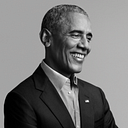Here’s Why I’m Celebrating Banned Books Week

From the time I first learned to read, books have played an essential role in how I experience the world. Reading Toni Morrison as a college student — novels like The Bluest Eye and Song of Solomon — changed me. Discovering writers like Mark Twain or James Baldwin revealed something essential to me about our country’s character and our history.
Books showed me how to step into someone else’s shoes and gave me a sense of my own identity — both of which would prove vital as a citizen, a community organizer, and president.
Today, books that shaped my life — and many others — are being challenged in schools, bookstores, and libraries by people who disagree with certain ideas or perspectives. Often, these “banned books” are written by or feature people of color and members of LGBTQ communities.
This is a mistake. Not only is it important for young people to see themselves represented in the pages of books, but it’s also important for all of us to engage with different ideas and points of view.
At some level, we are all connected. We share a common humanity. If we listen to each other instead of trying to silence certain voices and shut down debate, we can see each other for who we are and maybe even change some minds — or at least agree to live together. If we don’t, we’ll only grow further apart.
There’s also a very particular American tradition enshrined in the first amendment: that freedom begins with our capacity to share and access ideas, even ideas we may disagree with or find deeply offensive.
That’s why I’m celebrating Banned Books Week and the freedom to read with people across the country. Because the ability to learn about each other and engage with different ideas doesn’t just open our minds and broaden our perspectives — it brings communities together and strengthens our democracy.
What gives me hope is that young people, educators, librarians, and organizers seem to understand this better than most.
I’m thankful for leaders like Rebecca, one of our Obama Foundation Scholars, and Iesha who are making sure Chicagoans of all ages have access to powerful literature.
I’m grateful for people like Cameron who fought censorship in Texas by organizing a student-led movement that eventually distributed more than 700 challenged or banned books.
We also owe a debt of gratitude to the team at the Brooklyn Library, and everyone who is helping make sure that readers across the country have access to great books.
This Banned Books Week, I hope you’ll take a moment to appreciate the stories that need to be told. And I hope you’ll join me in reminding anyone who will listen — and even those who won’t — that the free, robust exchange of ideas has always been at the heart of American democracy.
